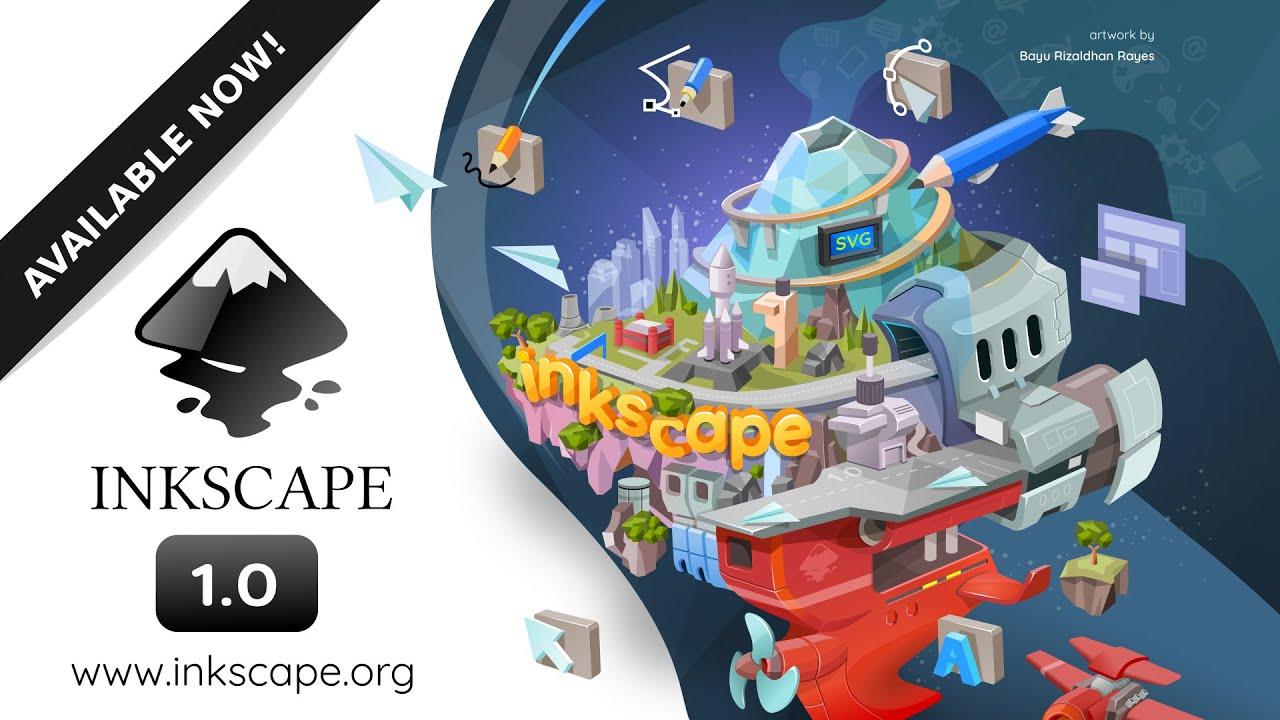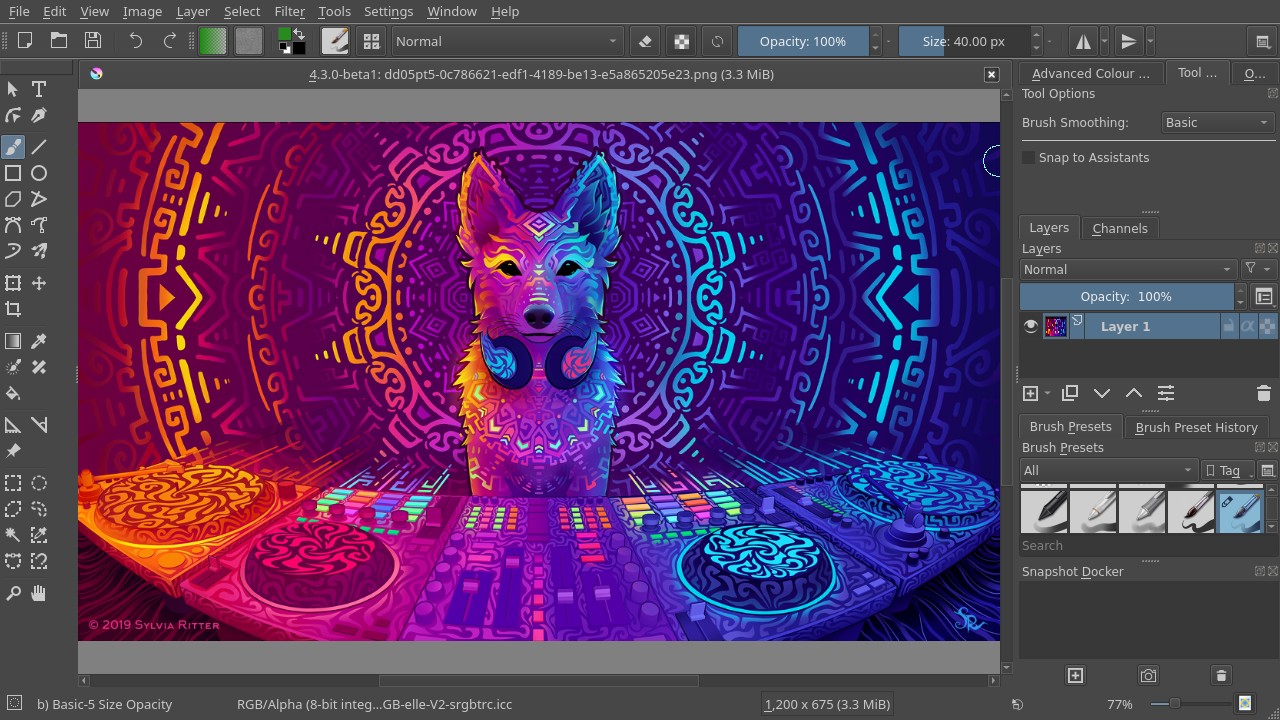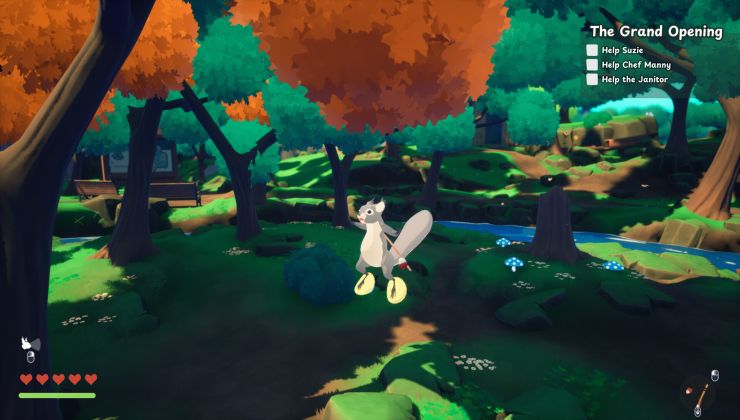Two big bits of software news for artists to share today as two major bits of FOSS software have big new versions up with Inkscape and Krita. Both examples of how great FOSS software can be, regardless of your use for designing game art or anything else.
After what feels like forever, vector graphics editor Inkscape finally hit the big 1.0 release yesterday! Such a huge release too moving over to GTK+3 for the interface bringing HiDPI improvements, better performance especially when editing node-heavy objects, a reorganized tool box with a more logical order to it, the canvas is more flexible for freestyle drawing, the UI is more customizable than ever, new PNG export options and the list goes on. You can see their official release video below:

Direct Link
We also have the painting app Krita, which has just seen the first 4.3.0 Beta version released coming around year after the 4.2 release. See the release notes here. This fresh update brings in some fun new filters, the performance of layer styles has been improved, window handling got more advanced as you can now detatch the canvas so it can have it's own window, you can save snapshots of the image at certain states to restore it, multiple new modes for the Gradient Tool and so on.
Additionally Krita's coloured brush tip image became more advanced, allowing you to set opacity and lightness separately, they say it enables you to "generate really impressive effects during the brushstroke".
Two awesome bits of FOSS software for creating various types of artwork and two huge releases. See more about each on their official site:
On the other hand I've never actually used Krita, I don't think. How does it compare to GIMP (which I'm moderately familiar with)? Not in a "which is better" way, I just want an honest evaluation of the strengths and weaknesses (or maybe the different design goals) of each. I'm always interested in finding and learning another cool FOSS tool. :)Gimp is a general purpose raster graphics editor whereas Krita's main focus is digital painting. If I need to manipulate an image in any way, I grab Gimp. If I feel creative and want to doodle a picture, Krita's slick UI and workflow can't be beat. Oh and Krita also has tools for keyframe-based 2D animation, but I'm not very familiar with that side of things.
Simple merging and page shuffling you can achieve easily with pdfshuffler. It has no editing features, but it does what it says on the tin and it does it intuitively. Just drag and drop files and pages, then save the result.Thank you so much! That's going to be very handy. I just went to install it, turns out my distro has it already installed and I never noticed the thing.
For those who wonder: At least Debian has replaced it by the fork "pdfarranger" (but has a compatibility package with the old name).
Debian also has pdftk, which used to be the go-to tool on the CLI for pdf shuffling needs (it's in java, so I *guess* it would be a bit faster than pdfarranger, which seems to be in python?). Fedora has 'pdf-stapler', which is also in python, which got introduced because pdftk stopped building on Fedora for some reason. That's what I've been using for merging/shuffling.
There's another java program with a nice GUI: https://pdfsam.org/
another one (free as in beer) that comes with a GUI: https://code-industry.net/free-pdf-editor/
-- what I'd *love to* know, though, is whether there exists a program that can edit logical page numbers on pdfs. Adobe Acrobat seems to be the *only* one capable of doing this *without breaking the pdf*. I have the final pre-CC version in a windoze VM (which I have to confess I'm glad I bought, on a really good student discount back in the day), which I hate to have to launch every time I have to fix the pagination on a pdf.
I mean, you'd think that it would be an easy task; but given the horribly convoluted data structures inside a pdf, even *finding* where the pagination info is, & changing turns into some kind of precision surgery. I've used a python library that claims to be able to do this (pylabels); but it keeps breaking the files, to the point that they can't be opened.
There are a lot PDF tools available. Finding the right one for your workflow, platform, and language can be tricky. I convert and merge a lot of images and documents to PDF for work. Sometimes I get to use Linux, but mostly Windows. I still choose programs that work on both platforms though.Simple merging and page shuffling you can achieve easily with pdfshuffler. It has no editing features, but it does what it says on the tin and it does it intuitively. Just drag and drop files and pages, then save the result.Thank you so much! That's going to be very handy. I just went to install it, turns out my distro has it already installed and I never noticed the thing.
For those who wonder: At least Debian has replaced it by the fork "pdfarranger" (but has a compatibility package with the old name).
Debian also has pdftk, which used to be the go-to tool on the CLI for pdf shuffling needs (it's in java, so I *guess* it would be a bit faster than pdfarranger, which seems to be in python?). Fedora has 'pdf-stapler', which is also in python, which got introduced because pdftk stopped building on Fedora for some reason. That's what I've been using for merging/shuffling.
There's another java program with a nice GUI: https://pdfsam.org/
another one (free as in beer) that comes with a GUI: https://code-industry.net/free-pdf-editor/
-- what I'd *love to* know, though, is whether there exists a program that can edit logical page numbers on pdfs. Adobe Acrobat seems to be the *only* one capable of doing this *without breaking the pdf*. I have the final pre-CC version in a windoze VM (which I have to confess I'm glad I bought, on a really good student discount back in the day), which I hate to have to launch every time I have to fix the pagination on a pdf.
I mean, you'd think that it would be an easy task; but given the horribly convoluted data structures inside a pdf, even *finding* where the pagination info is, & changing turns into some kind of precision surgery. I've used a python library that claims to be able to do this (pylabels); but it keeps breaking the files, to the point that they can't be opened.
I think PDFTK hasn't seen any development effort in quite a while and no one is maintaining the fedora port. If this is the project I'm thinking of compile dependencies rely on out of date libs. It does do well when doing things like merging pdfs, but there are other tools I prefer now.
In Fedora
sudo dnf install pdf-tools installs poppler-utils pdfunite, pdfsuffle, etc. These are pretty good for simple merges. I haven't used them as much as pdftk, nconvert, or wkhtmltopdf. There is also Pandoc as an option.XnView/nconvert is available across distros and platforms. This is one of my favorite utilities. It's not open source, but it does offer Linux native apps. I use this most because it's one of the most powerful options available on Windows, especially for images. It's fast and business licensing options are cheap It's free for personal use.
ImageMagick is available for image to PDF conversion. I use this as well, but it's not as performant as NConvert is for me.
If you are interested in something like Acrobat, there is [Master PDF Editor](https://code-industry.net/free-pdf-editor/) for Linux. There is a free lite version. The license is $70 for the full version. A little spendy, but not compared to Acrobat. I use this to fill in PDFs with forms and sign them. edit: I missed you linked this when I saw pdfsam.
Regarding Krita, Gimp, and Adobe
For me Krita is good enough to do simple image manipulation. I don't open Gimp often, but it's there for whenI need it and mostly for digital photos. Adobe doesn't really offer me anything over Inkscape. I use Inkscape and Krita together with a better workflow (for me) and less hassle and much less expense than Adobe. Adobe is fine, but not worth the price at all to me.
Last edited by randyl on 7 May 2020 at 7:18 pm UTC
Thanks, that's exactly what I was looking for! ^_^On the other hand I've never actually used Krita, I don't think. How does it compare to GIMP (which I'm moderately familiar with)? Not in a "which is better" way, I just want an honest evaluation of the strengths and weaknesses (or maybe the different design goals) of each. I'm always interested in finding and learning another cool FOSS tool. :)Gimp is a general purpose raster graphics editor whereas Krita's main focus is digital painting. If I need to manipulate an image in any way, I grab Gimp. If I feel creative and want to doodle a picture, Krita's slick UI and workflow can't be beat. Oh and Krita also has tools for keyframe-based 2D animation, but I'm not very familiar with that side of things.







 How to install Battle.net on Linux, SteamOS and Steam Deck for World of Warcraft and Starcraft
How to install Battle.net on Linux, SteamOS and Steam Deck for World of Warcraft and Starcraft How to play games from GOG and Epic Games on Linux, SteamOS and Steam Deck
How to play games from GOG and Epic Games on Linux, SteamOS and Steam Deck